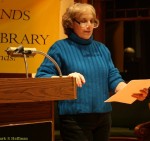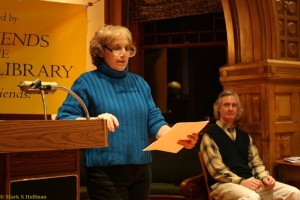Today at Harvard’s Joan Shorenstein Center on Politics, Public Policy and the Press, ProPublica “distributed reporting” editor Amanda Michel described a new form of newsgathering in which a few editors solicit and manage thousands of volunteers who research and write stories on a myriad of topics.
ProPublica is the nation’s largest nonprofit media organization to focus on investigative reporting. Founded in 2007, it is supported mainly by a $10M a yearly grant from the Sandler Foundation.
The method was developed by the Huffington Post during last year’s presidential campaign for a series entitled “On the Bus.” Michel directed that effort, which employed 5 journalists who worked with some 12,000 citizens.
Michel was hired in May by the New-York-City based ProPublica, which employs 32 journalists and is led by Paul Steiger, the former managing editor of The Wall Street Journal. Its managing editor is Stephen Engelberg, a former managing editor of The Oregonian, Portland, Oregon and former investigative editor of The New York Times.
As ProPublica’s “distributed reporting” editor, Michel first used “crowd sourcing” and collaborative journalism methods to report on the impact of the federal stimulus bill. She is now integrating those newsgathering techniques into ProPublica’s other investigative efforts.
To do so, she places queries on the ProPublica Web site, requesting assistance from the organization’s members, who are scattered throughout the US (and, possibly, abroad). They contribute their time “much as they would to a church or the humane society,” Michel said.
ProPublica editors collect information from the Internet and from members in the field–relying on journalists and volunteers for interpretation, analysis, and writing, Michel said.
To maintain quality control, the editors set forth certain reporting requirements and “play the numbers game”–that is, they may ask several people to look into the same topic or report on the same event.
Completed stories are provided at no cost to ProPublica’s newspaper partners. One story about wrongdoing on a California Nursing Board first appeared in the Los Angeles Times and later ran on the ProPublica Web site.
Current investigations described on the ProPublica Web site include “Buried Secrets, Gas Drilling’s Environmental Threat”; “Contractors in Iraq Are Hidden Casualties of War;” ” Strained by Katrina, Hospital Faced Deadly Choices” and “Problem Nurses Stay on the Job as Patients Suffer.”
Other news organizations such as the Wall Street Journal and WNYC radio, have recently hired journalists to serve as “putreach editors,” to develop “networked” or “citizen journalism.” The Cable News Network and Yahoo use similar techniques to engage the public in newsgathering, Michel said.
At today’s seminar, when a BBC editor cautioned that the “networked” method could easily be subverted by unsavory forces seeking to present disinformation, Michel countered that that’s already a problem in traditional newsgathering. “Reporters are often ‘played’ by sources,” she said.
Based on my background in the alternative press, (the Harrisburg Independent Press, AKA “HIP,” was a nonprofit) I think it’s exciting that members of the public can now help the media enhance understanding of the world we live in. However, like at least one seminar participant, I wonder how long people will remain interested in contributing their time for free.
Still, for journalists concerned about losing their jobs to unpaid competitors, not all is lost: ProPublica is one of the few news organizations that is now actually hiring!
Here’s a link to another writeup about the seminar. http://www.hks.harvard.edu/presspol/news_events/archive/2009/michel_12-01-09.html
Let me know what you think!
—–Anita Harris
New Cambridge Observer is a publication of the Harris Communications Group of Cambridge, MA. We also publish HarrisCom Blog.


